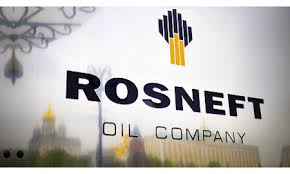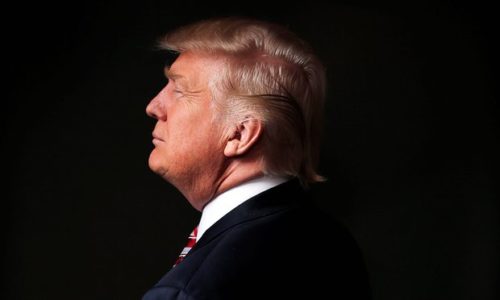
MOST AMERICANS have never heard of it, but Rosneft is one of the world’s largest publicly traded oil companies, with revenues of $91 billion in 2015 ranking 23rd overall among oil and gas concerns. Its majority owner is the Government of Russia—in other words, Vladimir Putin and his circle of oligarchs, including Rosneft CEO/Putin BFF Igor Sechin.
In 2012, Rosneft entered into a $500 billion joint venture with ExxonMobil, which at the time was run by current Secretary of State Rex Tillerson; it was this mammoth joint venture, apparently, that inspired Putin to award Tillerson the Medal of Friendship in 2013. The oil reserves in the Arctic, the reason for the venture, are estimated to contain 85 billion barrels. At a conservative price of $50 a barrel, that amounts to a staggering $4.25 trillion in potential gross revenue. Trillion, with a T.
These are dizzying numbers—but Putin will not see a kopek as long as the US continues to impose sanctions on Russia. Small wonder, then, that Putin and Sechin want the sanctions lifted as soon as possible. If and when that happens, the Exxon deal would be back on, and money would begin to pour in to the depleted Kremlin coffers.
Whether or not there proves to be collusion between the Trump campaign and the Russians, Putin clearly preferred Candidate Trump, if for no other reason than the GOP nominee was, and is, much more likely to lift those pesky sanctions than was Hillary Clinton, whom Putin perceived as a mortal enemy. The question is: Were the Russian president and his cronies willing to pay to affect that result?
Christopher Steele, the ex-MI6 spy who authored the infamous “golden shower” dossier, believed so. In the intelligence report dated 18 October, 2016, Steele observes that Sechin, the aforementioned president of Rosneft, “was so keen to lift personal and corporate western sanctions imposed on the company, that he offered [Carter] PAGE/TRUMP’s associates the brokerage of up to a 19 per cent (privatized) stake in Rosneft in return.”
We do not know if Trump accepted this offer—indeed, there is no evidence to suggest that he was even aware of it—and Page has vehemently denied being the intermediary, or of engaging with Sechin at all (although as I write this, the story has emerged that the FBI thinks otherwise; also, Page’s interview yesterday with Jake Tapper did not go well).
However, Rosneft did indeed sell off a percentage of its ownership—19.5 percent, almost exactly what Steele had reported—in January. The details of the transaction are predictably murky, with shell companies selling to other shell companies, who are owned by different shell companies, and so on to infinity. One reads the names of these ersatz enterprises—Glencore, Intesa SanPaolo, QHG Shares, QHC Holding, QHC Cayman Limited—and one finds one’s eyelids getting heavier, and one falling slowly to sleep.
But the Rosneft deal, the thinking goes, is the key to Trump/Russia’s Tier 3. If indeed Trump accepted Putin’s alleged bribe, if money changed hands, the funds would have had to come from the sale. Why else would the deal have even gone down, other than to create a vast web of shell companies impossible to track, so that a payment to Trump might be facilitated?
An investigator named Alex Mohajer postulates that this grafter’s hot potato ends with the Blackstone Group, owned and operated by Trump chum Stephen A. Schwarzman. That any of Trump’s associates have their fingerprints on the deal is, to be sure, enough to raise eyebrows.
https://twitter.com/AlexMohajer/status/830718560334798848
But there are some holes in Mohajer’s theory. First, Schwarzman is not Trump; if a good friend of mine suddenly makes a business deal, that doesn’t mean that I receive any profit. Furthermore, Blackstone can acquire whatever company it wants; scooping up Rosneft shares is not illegal at all. It may well be good business, especially if the sanctions get lifted.
More crucially, Mohajer—and other citizen journalists investigating the deal—is operating on the assumption that the 19.5% stake was the payout to Trump. And that’s just balderdash. Vladimir Putin is too smart to give Trump that much money; Mike Flynn took pennies on the dollar, Paul Manafort took a few million, and it follows that Trump’s price is presumably much lower than a full fifth of Russia’s premier oil company. Moreover, this is not what Steele reported: “he offered PAGE/TRUMP’s associates the brokerage of up to a 19 per cent (privatized) stake in Rosneft….”
The brokerage on a sale is not the thing being sold.
To me, the most interesting (potential) clue is this: Steele reported that the stake would be 19 percent; the actual amount sold was 19.5 percent. Assuming Steele is correct, wherefore this extra half a percent?
Let’s crunch some numbers:
The deal for 19.5 percent of Rosneft was priced at 10.2 billion euros—again, way more than would be required to buy off Trump. This means that the company is valued at something like 52.3 billion euros. A one percent stake is 523 million euros; half of that is 261 million euros, or about 277 million USD—a quarter of a billion dollars, give or take.
What if the discrepancy between the 19 percent reported by Steele and the 19.5 percent of the actual sale is the commission of the sale? In other words, what if that 261 million euros represented the bribe to Trump to lift the sanctions? Assuming, of course, that there was a quid pro quo of some kind.
Concealing the entire proceeds of the Rosneft deal is impossible, even for Putin, no matter how many shell companies in how many unscrupulous countries are involved. There’s simply too much cash for it to all disappear; it would take money laundering on a scale that would make Wilbur Ross blush. But 261 million euros? On a sale worth 10.2 billion? That’s like worrying over a missing hubcap when the Bentley gets totaled.
As it is, reporters have not yet determined who ponied up the cash for the purchase. “Although Qatar has never publicly confirmed how much it has contributed to the deal or the size of the stake that it bought, Glencore and Rosneft say it contributed 2.5 billion euros,” per the Reuters report. “Along with the 300 million from Glencore and the 5.2 billion loaned by Intesa, that still leaves a shortfall of 2.2 billion euros.”[1. Glencore, incidentally, is run by Marc Rich, who was famously pardoned at the eleventh hour by Bill Clinton for his tax evasion charge; this is not the most moralistically cool guy on the planet.] If 2.2 billion euros remain unaccounted for, what’s a paltry 261 million?
So let’s say Putin offered Trump, through enough intermediaries for both to be able to deny it, a half a percent of the company’s market value as commission. We need to start looking for reasons why Trump would be tempted by a one-time lump-sum payment of some $277 million. Like, for example, the fact that he owes almost exactly that amount to his largest known creditor, Deutsche Bank. The same Deutsche Bank that was fined for participating in a huge Russian money laundering scheme involving “mirror trades.”
To reiterate, this is speculation on my part, based largely on reporting by Christopher Steele in a dossier the GOP loves to point out is “unverified.” It may be that Page never met with Sechin’s people, never brought an offer to Trump, was with USC’s baseball coach during the entire summer, and Trump was merely the bumbling beneficiary of Russian cyber influence, and not a treasonous opportunist. But if a quid pro quo did indeed take place, the magic number is $277 million.
Let’s find it.




Great reporting! No wonder Trump won’t release his returns. Any connections between Rosneft & VEB?